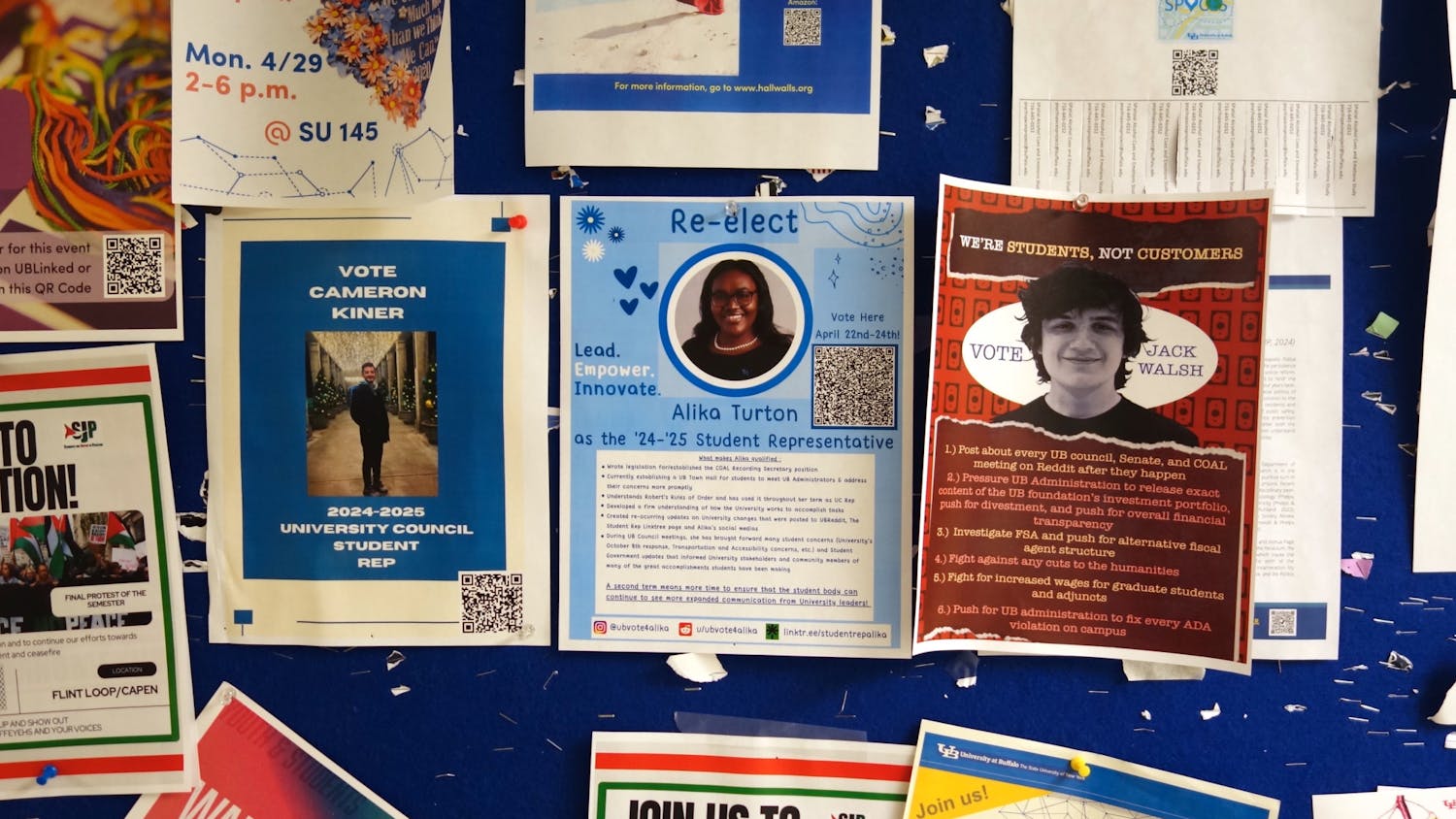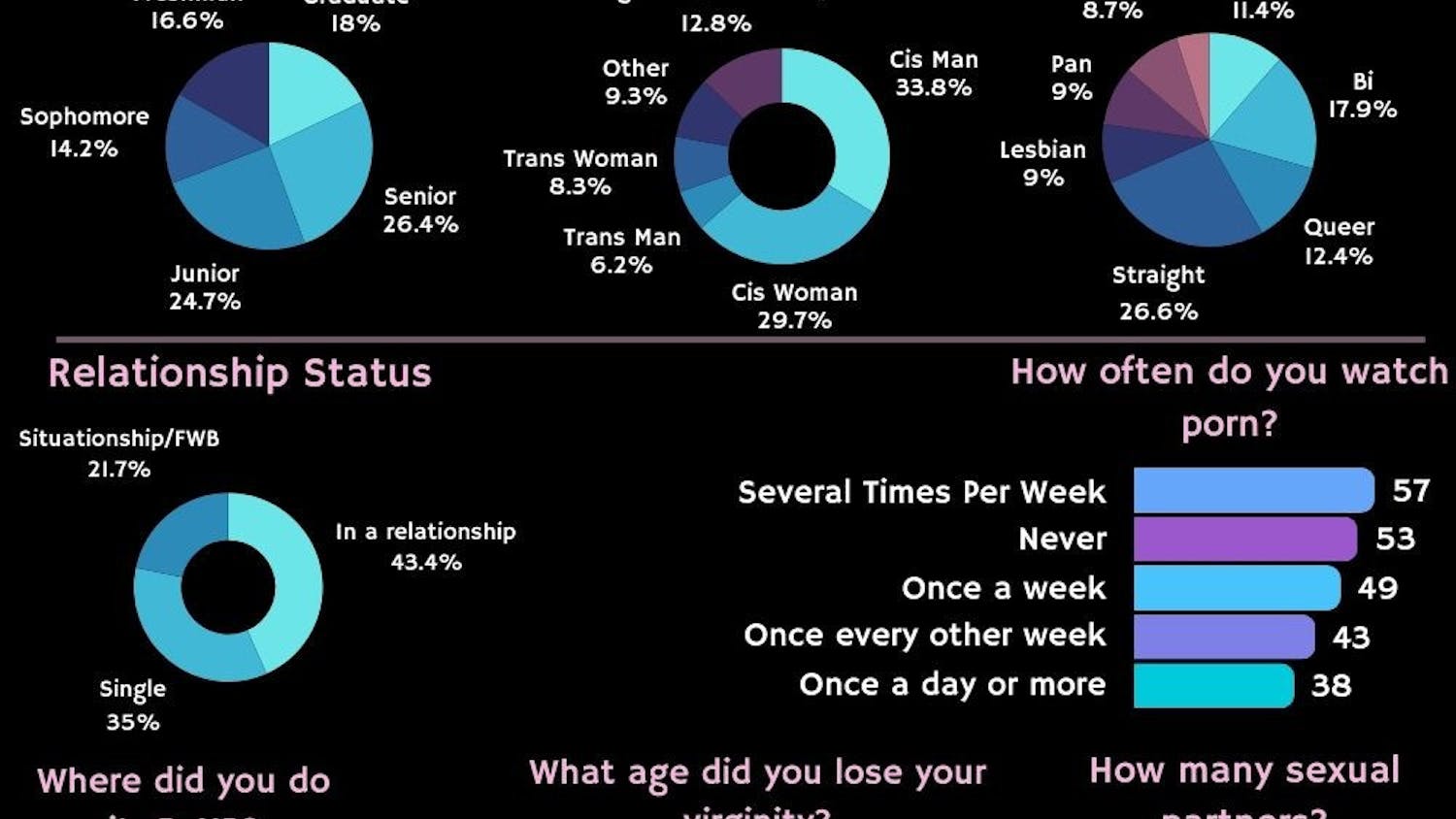*Editor's note: Some names in this story have been changed to protect sources' identity
Lust can only get you so far.
While relationships can often start off with simple sexual attraction, as well as some social media messaging and a “no labels” approach, it’s not long before the human mind and body need something more to make a relationship work.
The chemical high of infatuation can only be maintained for about 18-24 months, according to Dr. Timaree Schmit, a sex educator and sex columnist for The Philadelphia Inquirer.
“After that, a couple needs to replace the zany feel of love with something more substantive and intimate” Schmit said.
Thirty-eight percent of UB students are currently in a monogamous relationship, according to The Spectrum’s sex survey of 702 students. Long-term relationships – having someone you can trust, make corny jokes with and help you avoid dying die alone – is a goal for most people, including college students.
But those who have been dating the same person for more than a-year-and-a-half or so probably know the relationship – and the amount of work needed – changes after so much time together.
Katie Cardillo, a junior occupational therapy major, and Devin McGuigan, a junior aerospace engineering major, have been dating for more than two-and-a-half years.
“I’ve known who Katie was since middle school,” McGuigan said. “I instantly had a crush on her.”
McGuigan thinks that the couple has definitely “mellowed out” during the last couple of years as they’ve gotten older and matured.
Cardillo agreed, adding that she liked being able to depend on him and his support.
“It’s nice to have someone validate my feelings or tell me if I’m being nutty about something,” she said.
The couple lives together, so they are able to see each other every day. But as they’ve dated longer, they’ve found they’ve gotten less adventurous in the bedroom. “We definitely don’t try as many new things as we used to and I notice that the busier, the less often we engage in those activities, but in my opinion we still have sex pretty often,” Cardillo said.
This phenomenon is relatively common, as over time the intensity and eagerness should slow down, though people all differ in their sexual preferences and curiosities, Schmit said.
Schmit talks of “goal-oriented sex” and how having sex just to “clean the pipes” or out of routine can become boring or eliminate the desire to have it at all.
“We know that this one move, this particular sequence, this specific position is guaranteed to ‘work’ so we use it all the time,” Schmit said. “That takes all the mystery and excitement out of sex and tosses it right in the trash.”
Julia Miller*, a junior pharmacy major, and Adam Mann*, a junior mathematical physics major, have been dating for nearly a-year-and-a-half. They met in jazz band, where she sang and he played the drums.
Once they started dating, the two began to share friends and spend time both alone and together. When they first started out though, Mann took things slowly.
“Since this is my first relationship, I took things slow,” Mann said. “I didn’t want to get too ahead of myself. Then after a few months we started talking about having a life together. This is the part where we were both realistic and the strong emotional attachment began to kick in. We do have arguments here and there, but I don’t think there’s a relationship if you and your significant other don’t fight. It’s part of being in one.”
Miller describes their relationship as “really chill” and said that they hang out all the time, even if it’s just lunch or going to the library.
She also feels that as their emotions for one another have changed over time, their sexual energy has too.
“In the beginning we started off just hooking up and it meant a lot less,” Miller said. “After we started actually dating, it meant something completely different – kind of that cliché – ‘it’s not sex anymore it’s making love’ stuff. We have a healthy amount of sex and I think it strengthens our relationship a lot.”
Mann agrees that it’s a healthy part of their relationship and that it keeps things interesting.
Sexual compatibility is important in a relationship in order for it to continue working. This doesn’t necessarily mean that the sex you have with your long-term significant other has to be the best sex, but you have to agree on your limits and expectations.
“If you’re asexual or not generally interested in sex, it’s not a big deal,” Schmit said. “If having sex is a big part of your life in a major way you experience and express affection, it’s gonna be a big issue. That’s why everyone needs to know about themselves and communicate it to partners.”
It’s easy to assume that those who are in a long-term relationship have vanilla sex as well, which, according to Schmit, isn’t necessarily true. Though the newness does wear off, that doesn’t mean that the sex is any better or worse off.
Generally in long-term relationships there is “spice” initially, which is what leads the couple to continue seeing each other, rather than just “novelty” in which having sex a few times is all the pair wants.
“Too many people approach sex from a goal-oriented vantage [point] and then, without fail, the newness wears off,” Schmit said.
Schmit said it’s important to actively engage in communication with your partner in order to maintain the excitement of sex rather than settle into a routine.
Long-term relationships are just that: settling in with someone for the long run. Some of the stereotypes about long-term relationships and sex may not be accurate, though it depends on the couple, the relationship and the people involved.
*Names have been changed to respect the privacy of students
Tori Roseman is the senior features editor and can be reached at tori.roseman@ubspectrum.com.





